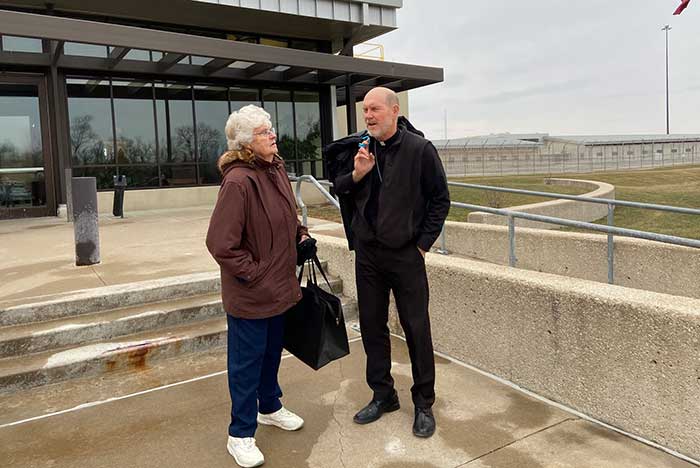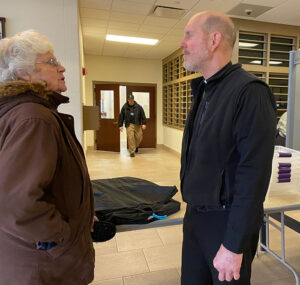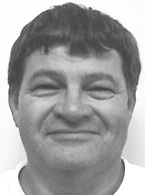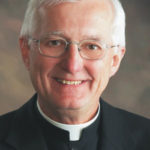
Bishop Thomas Zinkula talks with volunteer Jean Gunn outside the Iowa State Penitentiary in Fort Madison Dec. 21.
By Barb Arland-Fye
The Catholic Messenger
FORT MADISON — Bishop Thomas Zinkula enters the Iowa State Penitentiary chapel where David, an inmate, prepares for Mass. As the bishop approaches the altar, David’s eyes light up. “I praised the Lord we are able to have you back here,” he says to the bishop.
This is the first time in three years Bishop Zinkula is able to celebrate Mass at the maximum-security prison, due to the COVID-19 pandemic. Deacon Bob Gengenbacher of Holy Family Parish in Fort Madison, a prison volunteer, arranged the visit.
Fellow parishioner Jean Gunn, another longtime volunteer here, relishes the return to ministry at the prison. The men are like family and call her “Grandma Jean.” An inmate named Beto asks her, “Do you remember the lady who played the piano?” (during the bishop’s last Mass at the prison in 2019). Jean remembers, but says, “We can only have three people (volunteers) here at a time.” Nodding toward Beto, Jean tells the Messenger, “This is my grandson. We have a big family.”
As he chats with the inmates before Mass, Bishop Zinkula asks David, “Do people want me to hear confessions?” “I do,” David responds, before advising the bishop to hear confessions after Mass.
Several inmates set up portable chairs for Mass. Shaun distributes missalettes for the eight people in attendance in the classroom-sized chapel, which features bookshelves along two walls. Above one wall are several narrow, recessed windows that allow light into the room. A candleholder featuring an image of Our Lady of Guadalupe, patron saint of the Americas, stands on the altar between two white candles.
Bishop Zinkula tells his small congregation that he has chosen to celebrate Christmas early for them, using the readings from the Midnight Mass. “What’s your favorite song?” he asks the group. “Silent Night,” says Joe, and everyone else agrees. “I’m going to talk about Silent Night in my homily,” the bishop says. “We’re celebrating the birth of Christ our Savior, every one of us is in need of Our Savior.”
A Christmas miracle
The gathering sings “Silent Night” (all of the verses) acapella. One inmate each reads the first and second readings and responsorial psalm. Bishop Zinkula proclaims the Gospel and then gives a

Jean Gunn talks with Bishop Thomas Zinkula near the security entrance to the Iowa State Penitentiary in Fort Madison Dec. 21.
homily focused on a Christmas Eve event of more than 100 years ago that gave war-weary troops a night of peace and hope.
The bishop begins his homily by acknowledging the struggle to find peace in the world today. He refers to invasions (Russia in Ukraine), civil wars, terrorist insurgencies, drug wars, ethnic violence, tensions, and decades of strife in the Holy Land. “Meanwhile Christians continue to long, pray and work for the peace of the Kingdom inaugurated by Jesus Christ, ‘Prince of Peace.’ We join angels in praising God and saying: ‘Glory to God in the highest and on earth peace to those on whom his favor rests.’”
“Are we simply unrealistic dreamers? Heavens no! Christ’s peace can break into our world in amazing ways,” the bishop says, leading into the story of the Christmas Eve Truce of 1914 during World War I. “As the first Christmas of World War I approached, Pope Benedict XV asked leaders of warring governments to agree to an official ceasefire. He pleaded that ‘the guns may fall silent at least upon the night the angels sang.’ His plea, sadly, was ignored by government leaders, but many of the soldiers in the trenches declared their own unofficial truce.”
“This was one of the most remarkable events in the history of modern warfare. The ceasefire began with German soldiers singing ‘Stille Nacht’ from their trenches. British soldiers responded with Christmas songs of their own. Then, for several hours on Christmas Day 1914, a large number of Allied and German soldiers set aside their weapons, and climbed out of their trenches. They ventured into the highly dangerous ‘No Man’s Land’ to share gifts of tobacco, food, liquor and more. They even played an improvised game of soccer, creating a ball by stuffing a cap with clothing. Time magazine estimated that more than 100,000 soldiers participated in the Christmas Truce. The next day, Christmas Day, the opposing sides retrieved their dead and participated in joint burials and services.”
“What an incredibly inspiring Christmas story! Humanity recognizing humanity for a time.”
“Unfortunately, high-ranking officers ordered all such truces to stop, and the killing started again. Nonetheless, the story endures because it speaks to both the generosity of the Holy Spirit in the worst of times and the hope that accompanies the annual celebration of the birth of Christ.”
Lasting impressions
After Mass and returning from confession, David says Bishop Zinkula’s homily “struck a chord with me. Daily life in prison can become pretty challenging. You can become frustrated, upset by others who are trying to hurt you emotionally. It’s interesting how (the bishop) spoke of people at conflict. … They were able to stop fighting for Christmas Eve. It puts things in perspective. It made me think. As a human being you feel picked on, bullied, or (viewed) poorly and you want to fight back and you want to react. It makes me stop and think. What can I do to try to remedy the situation?”
“I’m far from perfect,” David says. “I’m only human. You can’t change what happened in the past that brought you to prison but you can grow as a person, as an individual. I can’t change the past but I can change how I treat others and how I handle myself.”
Another inmate named David expresses appreciation for the bishop’s visit and the inspiration gained from his homily. “To hear about Christ’s power in a conflict, with forces fighting each other and that they could come together in Christ, even if just for a day” is inspiring. “We all need God in our life. There are too many earthly vices and temptations in our world,” David says. “God gives us everything we have. I think people forget that.”
An inmate named Tayvon has been longing to attend Mass and was grateful that Bishop Zinkula took the time to travel to Fort Madison (two hours from Davenport) to celebrate Mass with him and the other men. “His story about the ceasefire puts your faith back in humanity,” Tayvon says. He hopes to internalize the message and to pass it on. It is “something I look forward to sharing when I get back to the unit, sharing that message, especially around Christmas. We should all come together, put our differences aside and celebrate the Lord.”
Prison ministry
Deacon Robert Gengenbacher of Holy Family Parish in Fort Madison and a volunteer at the Iowa State Penitentiary said the clergy of the Diocese of Davenport’s Keokuk Deanery conduct bi-

weekly celebrations at the prison. The priests rotate as their schedules allow, he said. A few retired priests have volunteered to assist as well.
Several other potential volunteers have made application to the Iowa Department of Corrections and are awaiting approval, Deacon Gengenbacher said. “We are always open to other Catholics willing to apply for visitation rights. The process is lengthy and background checks are necessary. I will tell you that the thought of entering a state prison is not to be taken lightly. There is always the possibility of a lock down while you are behind the gates. This did happen with one of our priests who was inside for about four hours before being allowed to exit the prison. Prison personnel always make the safety of visitors their top priority.”
He asks that the faithful pray for the men in prison. “We outsiders don’t know how hard it must be to ‘keep the faith’ behind bars.”











